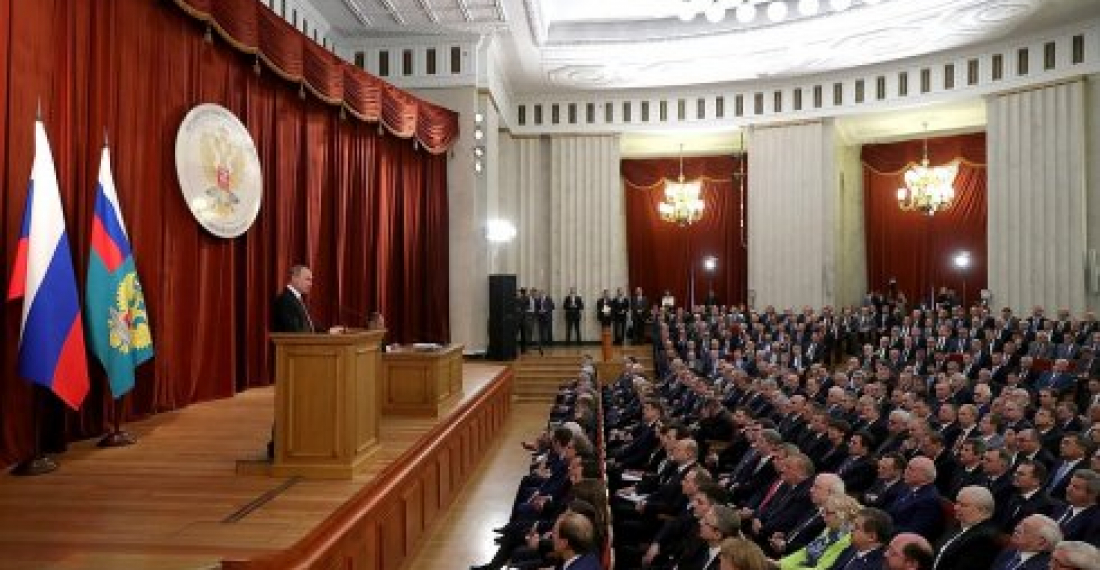Russian President Vladimir Putin on Thursday (19 July) addressed ambassadors and permanent representatives of Russia at a traditional biannual meeting which is usually also attended by government and parliamentary leaders, as well as the heads of ministries and agencies involved in international activities and members of the research, expert and business communities.
Fresh from the controversial Helsinki summit with US president Donald Trump. President Putin used the occasion to spell out the current priorities in Russian foreign policy, and to lash out at critics of Russia - and of president Trump - in the United States.
I would like to point out that Russia's active involvement in global affairs is driven by our priority national interest, which is to create favourable and safe conditions for the country's breakthrough development, for attaining large-scale social and economic goals and for improving the quality of life for the people.
Our people want Russia to be a strong, independent and peaceful state. We are open to partnerships, to mutually beneficial and constructive relations with all countries and regional associations.
After refering to ongoing international crises in Syria, Korea, Iran, and Ukraine, president Putin delved straight into what he sees as the core of Russian government priorities. He said,
Colleagues, our foreign policy efforts are not aimed at achieving some kind of speculative greatness or creating problems for others. Let me reiterate that what matters most is ensuring the right conditions for the sustainable development of our country. In the years to come, Russia must not only firmly establish itself among the world's top five economies, but also substantially improve the key standards related to the quality of life of its citizens. To achieve these strategic objectives we must make full use of our foreign policy opportunities. It is important that we focus our efforts on achieving specific, pragmatic results, tap new markets, expand exports and gain access to advanced technology and investment, while overcoming the obstacles and limitations Russian companies face in foreign markets.
In today's world, the principles of competition and openness in global trade are increasingly replaced by protectionism, while economic gain and expediency are swapped for partisan agendas and political pressure. Economic ties and entrepreneurial freedom are being politicised. Against this backdrop, Russia's foreign policy must run counter to this trend by being more economically driven and rational. Creating a space of good neighbourly relations, wellbeing, security and stability along the entire perimeter of our state border has special importance.
President Putin hailed the achievements of the Eurasian Economic Unioin (EAEU):
The Eurasian Economic Union is a key integration project for Russia. It is gratifying that our partners are guided by the same priorities as we are within the EAEU, and we implement them together quite effectively. The essence of these approaches is to use the opportunities arising from the integration processes to stimulate economic growth in all member countries so that citizens and businesses benefit from this cooperation.
We also believe in the importance of stepping up EAEU contacts with other countries. Its free trade area with Vietnam has been launched, and talks are underway with Israel, Serbia and Singapore. Consultations with Egypt and India are to begin soon. A temporary agreement paving the way to the creation of a free trade area with Iran has been signed. All in all, there are about 50 proposals aimed at establishing partnerships with the Eurasian Economic Union.
Good prospects are opening up due to joint efforts with China resulting from the Agreement on Trade and Economic Cooperation signed in May between Beijing and the Eurasian Economic Union. The Eurasian Economic Union and the Belt and Road Initiative are efficiently complementing each other. Harmonisation of these projects can lay the foundation for establishing a Greater Eurasian Partnership - an economic cooperation space that is as free as possible from all barriers.
We should apply the same logic to developing relations with the European Union, which remains one of our major trade partners despite current difficulties. We have many overlapping economic interests with the EU. Our common transport and energy infrastructure has been developing for decades. I would like to emphasise that all the business projects that we are implementing with Europe, including, for instance, Nord Stream 2, are solely commercial and economically viable; they are not politically charged and have no hidden agenda.
President Putin than cambe back to one of his favorite themes - NATO expansion
The key to providing security and safety in Europe is in expanding cooperation and restoring trust, and not in deploying new NATO bases and military infrastructure near Russia's borders, which is what is taking place now.
We will respond appropriately to such aggressive steps, which pose a direct threat to Russia. Our colleagues, who are trying to aggravate the situation, seeking to include, among others, Ukraine and Georgia in the orbit of the alliance, should think about the possible consequences of such an irresponsible policy.
Putin lambasted critics of Russia - and of President Trump - in the United States, whilst evaluating positively the Helsinki summit:
Of course, it would be naive to believe that the problems that piled up over years would be resolved in a matter of several hours. No one was counting on this. However, I believe that we have embarked on a path to positive changes.Importantly, a full-fledged summit with an opportunity to talk directly has finally taken place. It was overall successful and led to productive agreements. We will have to wait and see, of course, what turn the events will take, all the more so as certain forces in America are trying to downplay and disavow the results of the Helsinki summit.
source: commonspace.eu with the press service of the president of Russia
photo: President Vladimir Putin addressing Russian diplomats in Moscow on 19 July b2018 (picture copurtesy of the press service of the president opf Russia






